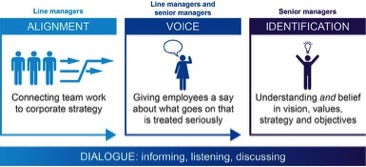
In January 2016, Bruce Berger, Ph.D., professor emeritus, University of Alabama, and research director of The Plank Center for Leadership in PR, posed the question ‘Does Organizational Communication Research Matter?’
I am happy to report that the resources provided by the Organizational Communication Research Center are highly valued by PR Academy students as our courses place a significant emphasis on robust research. This is contributing to the development of a more strategic, evidence-based, approach to practice in the UK.
When I completed my recent Ph.D. research at five organizations, I found further evidence that supports an association between internal communication and organizational engagement (which is different from job engagement). My study suggests that the association is more of an emotional than a rational (cognitive) connection. When employees receive the information that they expect in the right way and when they are given a voice that is treated seriously this makes them feel more valued. And this is associated with what employees do to help the organization succeed. The thesis establishes an approach termed ‘Informed Employee Voice’ that is associated with organizational engagement, as shown in the diagram below.

I also found some examples of low levels of satisfaction with organizational communication in my study. This can be related to a wider point about how slowly organizational communication practice is evolving. As Bruce Berger reflects in his blog, there are a number of seemingly long-term obstacles, summarized by what seems to be an enduring emphasis on message sending and catchy slogans rather than listening and dialogue. Given that there is now a wide body of research that shows how practice that moves beyond one-way communication is associated with engagement and enhanced business performance, why is it that we still see a lot of practice that is based solely on ‘messages to rouse the troops’?
As part of a critical realism approach to my thesis I considered why general levels of satisfaction with organizational communication (and by association employee engagement) are not higher. Two potential explanations emerged:
- An emphasis on shareholder value rather than employee value
- The professional status of internal communication practice as a marginalized and weakly represented function.
These are potential systemic explanations that can be related to power structures that may not always be very apparent. On the first point, although senior managers say they understand the importance of internal communication, it is perhaps only a surface level recognition. As one employee said to me about a comment made to senior manager at an employee roadshow event, ‘he smiled, but not with his eyes’. This may be the result of a focus on shareholder value that dominates business studies and executive training. Employee communication is rarely covered in any depth. If it was made a more central element of business studies then attitudes might eventually change.
On the second point, in the UK, we are witnessing an increasing appreciation of the professional status of employee communication which is underpinned by training and education. However, at the same time, practice continues to be marginalized by a number of PR academics and practitioners. For example, in some contemporary publications about PR, employee communication is barely mentioned. And yet, as the Chartered Institute of Public Relations State of PR 2016 Report reveals, 53 percent of PR people spend most or some of their time on internal communication.
Although there are estimated to be 45,000 internal communication practitioners in the UK, only a tiny percentage are members of a professional institute which means that those institutes have limited resources to represent the profession and to argue the case for its value (for employees and organizations). Perhaps it is now time for employee communication professionals to come together in a united multi-national network to establish a stronger independent voice rather than allow the value of their important, evidence based work, to be crowded out in the communication mix.
These are both big issues. But unless we acknowledge them and start to address them, the full potential benefits of employee communication based on robust research are going to take some time to be realized.

Kevin Ruck, Ph.D., is co-founder of the PR Academy and the editor of ‘Exploring Internal Communication’. Follow on Twitter @PRAcademy.



